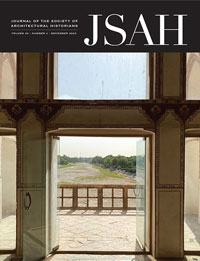-
Membership
Membership
Anyone with an interest in the history of the built environment is welcome to join the Society of Architectural Historians -
Conferences
Conferences
SAH Annual International Conferences bring members together for scholarly exchange and networking -
Publications
Publications
Through print and digital publications, SAH documents the history of the built environment and disseminates scholarship -
Programs
Programs
SAH promotes meaningful engagement with the history of the built environment through its programsMember Programs
-
Jobs & Opportunities
Jobs & Opportunities
SAH provides resources, fellowships, and grants to help further your career and professional life -
Support
Support
We invite you to support the educational mission of SAH by making a gift, becoming a member, or volunteering -
About
About
SAH promotes the study, interpretation, and conservation of the built environment worldwide for the benefit of all
This inaugural event organized by members of the SAH Climate Change and Architectural History Affiliate Group broaches questions about the status of architectural history in a warming world. The panel highlights current research by established and emerging scholars working at the intersection of the architectural and environmental humanities. Their work reveals how climate change can be a driving force behind our research agendas, opening new avenues of investigation, and establishing working methods in the service of social and environmental justice.
The panel is also a call to action. We believe that the unbounded and existential nature of the climate crisis calls for a broad scale re-imagining of the role of architectural history in the academy, and for humanities scholars of all stripes to join in the fight against climate change by excavating and exploring the challenges that lie ahead. Indeed, the multi-generational nature of the climate crisis suggests history should play a greater role in imagining post-anthropocentric futures. Topics related to environmental change and adaptation are inseparable from longer histories of extraction, medicine, race, colonialism, and the geopolitical construction of “third worlds.” They also demand rigorous attention to the interfaces between science and technology in architectural culture, and to the situating of climatic discourses in multiple knowledge spheres, spanning geographic, social, and material divides.
Accordingly, this panel challenges participants to think past technical interpretations of climate in order to view climate as a locus for multidisciplinary practice and thought. The presentations and discussion together highlight the need for interdisciplinary and transnational approaches to writing architectural histories of climate change, encompassing especially the Global South and other marginalized geographies, where the violent effects of global warming are being etched onto social and physical landscapes in real time through an unfolding humanitarian crisis. Questions guiding our collective inquiry include: what can architectural history teach us about our present climate crisis? And how can architectural historians join in the fight against climate change?
Co-Moderators:
- Priya Jain, Texas A&M University, Department of Architecture
- Ana Ozaki, Mellon Race, Place, and Equity Postdoctoral Fellow, University of Virginia
- Dustin Valen, Toronto Metropolitan University, Department of Architectural Science
Panelists:
- Menna Agha, Carleton University, Azrieli School of Architecture & Urbanism
- Nida Rehman, Carnegie Mellon University, School of Architecture
- Avigail Sachs, University of Tennessee, College of Architecture + Design
- Emily Scott, University of Oregon, College of Design
Speakers

Menna Agha is an assistant professor in the Azriehli School of Architecture & Urbanism at Carleton University. She is an architect and researcher who has recently been coordinating the spatial justice agenda at the Flanders Architecture Institute in Belgium. She is a third-generation displaced Fadicha Nubian, a legacy that infuses her research interests in race, gender, space, and territory. Among her publications are: Nubia still exists: The Utility of the Nostalgic Space; The Non-work of the Unimportant: The shadow economy of Nubian women in displacement villages; and Liminal Publics, Marginal Resistance.

Priya Jain is an associate professor in the Department of Architecture at Texas A&M University. An architect licensed both in India and the US, she has worked on the restoration and adaptive use of a diverse range of buildings. Her research is focused on the histories of twentieth-century South Asian architecture in a transnational context, as it relates to colonization, materials, technology and climate.

Ana Ozaki is an architectural historian and the Mellon Race, Place, and Equity Postdoctoral Fellow at the University of Virginia. Ozaki's research investigates how racial ideologies have interfered with architectures of climate and the environment within the African diaspora, mainly within the Black Atlantic. Centered on Brazil's construction of a tropical architectural ideal, her dissertation, "The Brazilian Atlantic: New 'Brazils,' Plantation Architecture, Race, and Climate in Brazil and Africa, 1910–1974," examined the country's connections to West and Southern Africa, specifically Nigeria, Angola, and Mozambique. She has previously held positions at Princeton University, Barnard College, Columbia University, UCLA, and Cornell University.

Nida Rehman is an urban geographer and Assistant Professor of Architecture at Carnegie Mellon University. She researches uneven histories, politics, and ecologies of urban landscapes and how people engage urban nature to create possibilities for change. Her recent publications include articles in IJURR, Antipode, Planning Perspectives, and Comparative Studies of South Asia, Africa and the Middle East. She is the co-founder of the South Asian Urban Climates collective and recipient of the 2022 SOM Foundation Research Prize and the 2019 Urban Studies Foundation seminar series award.

Avigail Sachs teaches landscape and architectural history and theory at the University of Tennessee, Knoxville. Her book, The Garden in the Machine: Planning and Democracy in the Tennessee Valley Authority, was published by the University of Virginia Press in April 2023. She is currently completing a collaborative project documenting the environmental changes wrought by the TVA, which will combine maps, photographs, and text to examine the “mechanized” landscape. Sachs is also the author of Environmental Design: Architecture, Politics and Science in Postwar America (2018).

Emily Eliza Scott is Assistant Professor of History of Art and Architecture and Environmental Studies at the University of Oregon. Her research focuses on art and design practices that engage pressing (political) ecological issues, often with the intent to actively transform real-world conditions. She has coedited three volumes, including The Routledge Companion to Contemporary Art, Visual Culture, and Climate Change, edited with TJ Demos and Subhankar Banerjee (Routledge, 2021), and Critical Landscapes: Art, Space, Politics, edited with Kirsten Swenson (UC Press, 2015).

Dustin Valen is an architectural historian and design educator in the Department of Architectural Science at Toronto Metropolitan University. His research and teaching addresses the intersection of architecture, imperialism, and the environment during the nineteenth and twentieth centuries and spans several geographies, including Canada, Britain, and the United States.


